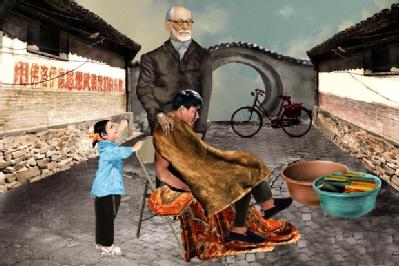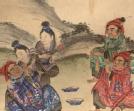China and the Human Sciences: 1600 to the Present

About the CHS Project
Funded by the Arts & Humanities Research Council, "China and the Human Sciences: 1600 to the Present" is a two-year international research networking project running from August 2014 to July 2016. It is a collaboration based on well-established relationships between the two main investigators (Howard Chiang and Hsiu-fen Chen) and the four partner research institutions (Warwick's Department of History, National Chengchi University's Department of History, National Yang-Ming University's Graduate Institute of Science, Technology, and Society, and Nanyang Technological University's School of Humanities and Social Sciences), and drawing on the scholarly and outreach expertise of all network partners.
At Warwick, this research expertise includes a Global History and Culture Centre, home to scholars of Chinese history, global history, and cultural history across the early modern and modern periods; a Centre for the History of Medicine, with the majority of its academic staff specializing in the history of the human sciences; and a Being Human Network.
Abstract
 The overall aim of this project is to coordinate a global research network on the history of the human sciences in China from the late imperial period to the present. In leading up to the establishment of this research network, the proposed series of academic and impact activities (including conferences, panels, workshops, and public lectures) will generate two specific research outputs. The first is the production of a comprehensive text that introduces the historical development of various aspects of the human sciences in China since 1600. Incorporating feedback from practitioners in the human sciences and the relevant health professions over the course of this networking project, this text will be organized around four themes: "the parameters of the living," "the making of the modern subject," "disciplining knowledge," and "deciphering health." This book will serve as a state-of-the-field survey, a landmark textbook for teaching, and a field-consolidating reference for stimulating future research. The second is the publication of a special issue of History of Science 53.1 (2015), a leading journal in the field of the history of science, titled "Ordering the Social: History of the Human Sciences in Modern China." This journal volume features original articles that represent the newest research in the history of the Chinese human sciences in the twentieth century.
The overall aim of this project is to coordinate a global research network on the history of the human sciences in China from the late imperial period to the present. In leading up to the establishment of this research network, the proposed series of academic and impact activities (including conferences, panels, workshops, and public lectures) will generate two specific research outputs. The first is the production of a comprehensive text that introduces the historical development of various aspects of the human sciences in China since 1600. Incorporating feedback from practitioners in the human sciences and the relevant health professions over the course of this networking project, this text will be organized around four themes: "the parameters of the living," "the making of the modern subject," "disciplining knowledge," and "deciphering health." This book will serve as a state-of-the-field survey, a landmark textbook for teaching, and a field-consolidating reference for stimulating future research. The second is the publication of a special issue of History of Science 53.1 (2015), a leading journal in the field of the history of science, titled "Ordering the Social: History of the Human Sciences in Modern China." This journal volume features original articles that represent the newest research in the history of the Chinese human sciences in the twentieth century.
This research network extends the most cutting-edge research agenda of global Chinese studies. Given that the preoccupation with knowledge about "being human" and human difference has a long history and continues to take on different configurations within the field of China studies, the proposed research network provides a timely opportunity for scholars-both emerging and advanced-who have been looking at similar historical issues, but who have yet to come together as a group in order to synthesize their overlapping concerns. In consolidating a global research network around the theme of "China and the Human Sciences," the proposed series of activities will also make major interventions beyond Sinology, such as in the fields of comparative literature, cultural studies, and the history and philosophy of science. These interventions will build on the long chronological focus of this project and thereby problematize conventional chronological divisions (e.g., early modern, modern, contemporary, etc.) that are widely adopted in disciplines across the humanities. They will also contribute new historical insights to contemporary debates on the contradictory perceptions of China in mainstream Western discourses as the anti-thesis of human rights and a rising economic superpower.
Planned Impact
This network has four main areas of impact:
- To provide the general public a basic understanding of the development of the human sciences in China in regional and global contexts.
- To disseminate the research findings and relevant controversies on the World Wide Web.
- To aid practitioners and researchers in the human sciences (including the health profession) foster a stronger appreciation of the humanistic dimensions of their work, including its historical, social, cultural, and political underpinnings, which would in turn benefit their subsequent interactions with people outside their specialty (including, for instance, patients).
- To create awareness among the wider community in the human sciences of the interactive nature and mutual influence between scientific developments and narratives about their histories and cultures.








